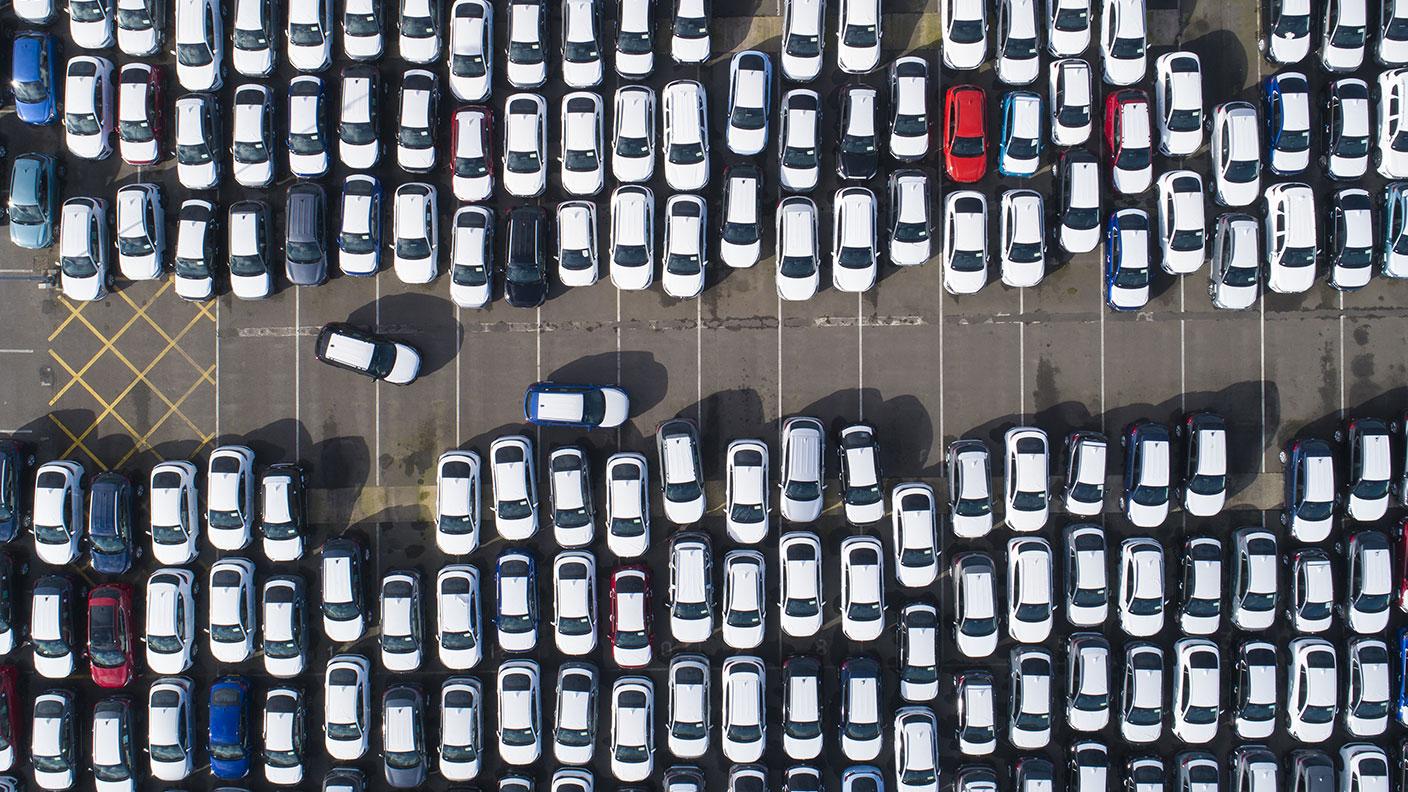In the future, no one will own a car. Here’s why and what it means for investors
Sales of new cars are plummeting. If Dominic Frisby’s experience is anything to go by, that’s no surprise. Soon, nobody will ever need to own a car again. Here’s why.

Get the latest financial news, insights and expert analysis from our award-winning MoneyWeek team, to help you understand what really matters when it comes to your finances.
You are now subscribed
Your newsletter sign-up was successful
Want to add more newsletters?

Twice daily
MoneyWeek
Get the latest financial news, insights and expert analysis from our award-winning MoneyWeek team, to help you understand what really matters when it comes to your finances.

Four times a week
Look After My Bills
Sign up to our free money-saving newsletter, filled with the latest news and expert advice to help you find the best tips and deals for managing your bills. Start saving today!

Car sales in Germany slumped by 30.5% compared to the same month last year, I read this morning on Twitter.
Worryingly for the German giants, Audi was down 77.7%, Porsche 75.5% and Volkswagen 61.9%.
If my own experience is anything to go by, further falls lie ahead.
MoneyWeek
Subscribe to MoneyWeek today and get your first six magazine issues absolutely FREE

Sign up to Money Morning
Don't miss the latest investment and personal finances news, market analysis, plus money-saving tips with our free twice-daily newsletter
Don't miss the latest investment and personal finances news, market analysis, plus money-saving tips with our free twice-daily newsletter
I'm getting more and more interested in the future of urban transport systems, as the asset-light generation Generation Rent, the generation which prizes experience over material things, and does not want the hassle of ownership comes into prominence.
I got a little taster at the weekend of what lies ahead.
You really don't need to own a car anymore
Let's start with a little bit of back story.
I acquired my first car in 1987, when, as a sprightly lad of 17, I passed my driving test at the second attempt. My mum gave me her car so she could buy a new one.
During the 2000s, however, the costs of owning a car began to nag away at me. There were the constant incidental payments parking, insurance, fines.
And then there was the fact that whenever I bought a car, the Parker's or Glass's guides always seemed to suggest that the value of the car was below what I was having to pay; yet whenever I sold, those same guides always suggested it was worth more than the price for which I was able to sell.
I was also always conscious of the stat maybe an urban myth that you could get taxis for every journey you make in a car and, over the course of a year, it would still work out cheaper.
Meanwhile, as I got older (and was working out of town less and less) I was using the car less and less. The value it offered seemed to be constantly shrinking.
The last car I owned a beautiful Mercedes convertible, don't you know I ended up leasing, and when the lease ran out, I didn't get round to leasing another straight away.
In the meantime, I started using Uber. This is rather convenient, I thought. I began sending Uber to pick up my kids. The 20-minute drive to get a son from footy or a daughter from friends, the waiting in between, and the 20-minute drive back meant I kept losing large chunks of my day.
Uber got me the time back. I could track exactly where they were and who was driving them at any given moment, so safety was not an issue. Over the course of a year, it worked out cheaper.
When I needed a car myself, I could use the Zipcar parked opposite my house, or I could schlepp over to the car hire place and rent one. So I never got another car.
This schlepp started to get on my nerves, however. The nearest car hire outlet is about two or three miles away; they only come and pick you up when they're not busy; the admin always seems to take an age; there were often queues; you had to go through the same rigmarole when you returned the car; and you were limited by their opening hours.
The other day I had to drive to Leicester and back. To avoid the car hire place, I used Zipcar, but then I got hit with a large charge because I went so far over their (to be fair, clearly stated) 60-mile-a-day limit. That irritated me.
I quite like Zipcar, but it's designed for short-term, short-distance hire. There has to be something better, I thought, a way of hiring a car for a longer-distance drive over , say, a weekend that doesn't necessitate me having to go the car hire place. But I never seemed to be able to find anything. (I know I am massively behind the curve on this.)
However, this weekend I had to drive to Devon, so I searched again. This time an ad for a company called Drivy popped up.
My experience with AirBnB for cars
This looks interesting, I thought. It's basically AirBnB for cars a peer-to-peer, car-hire platform. If you own a car, but perhaps don't use it all the time, you can put it up for hire through the Drivy platform. There are all the vetting procedures you would expect, plus there is a user-review system that ensures high standards.
To my surprise, there were all sorts of cars advertised within half a mile of my house, all available at short notice. I only skim read the list, but I noticed a BMW 5 series and a Fiat 500 so there's a good range, from big to small. I went for a Kia Optima Sportswagon, because it seemed cheap (£105 for three days), was parked only about ten minutes' walk away, and I'd never driven a Kia before.
I registered with the site, was approved and booked the car within a few minutes. I was able to start the hire at 11:30 at night, which I liked (I wanted to have the car parked outside my house and be able to leave at the crack of dawn the next day).
Just before the hire, I got a notification from the Drivy app. It linked to both Google and Apple Maps, so I was able to find the car easily, parked up a side road. The app on my phone opened the car. The keys were inside. I was then instructed to photograph the car inside and out and the app uploaded the photos to HQ. This took no more than a minute, and I was good to go.
The car had only done 9,500 miles. It was immaculately presented. It drove beautifully and economically. I am now a Kia fan, and would buy one were it not for the fact that I have no intention of ever buying a car again.
Three days later I returned the car once again at 11:30 at night. You had to return the car with the same amount of fuel as you took it (or pay the difference) and you had to return the car in a presentable state (or pay a cleaning fee). I did both, drove the car back where I had found it, photographed the outside, uploaded the photos, left the keys inside, hit "end rental" on the app and the car automatically locked.
Shortly after, an email arrived telling me that I had checked out successfully. I was also sent an adjustment bill as I had gone over the 100-mile-a-day limit (17p a mile about a third less than Zipcar, which also has a lower daily limit). All-in-all it was a lot more convenient than the car hire place.
What does this mean for the future of driving?
There are several takeaways from this. First, I now feel even less need to buy a car than I did. Others will feel the same way. This is another step forward for the so-called sharing economy. (When cars go driverless, even fewer people will buy.) Car ownership, especially in cities, will continue to fall.
Second, if you do own a car, but don't use it all the time, then you should sign it up to a peer-to-peer car hire company (Drivy is not the only one) and get it working for you. If I had a forecourt of some kind, and was that way inclined, I would buy several vehicles and sign them all up.
I've no doubt we will see many people doing this as they wake up to the opportunity. The platform has created opportunities for ordinary inclusion in the car rental business.
Finally, peer-to-peer car hire companies (for example, EasyCar, Drivy, Turo, Hiyacar) are, surely, going to do to traditional car hire firms what AirBnB has done to the hotel business. It's one of those transformations, I guess, that will be gradual, then sudden.
Enterprise (which also owns Alamo and National) is privately owned, but Hertz (NYSE: HTZ), which also owns Dollar Thrifty, and Avis (NYSE: CAR) cool ticker! are both listed. I would not want to own either in my portfolio. Longer-term, they are probably a short. If peer-to-peer car hire can get in on the airport game, they almost certainly are.
Get the latest financial news, insights and expert analysis from our award-winning MoneyWeek team, to help you understand what really matters when it comes to your finances.

-
 Should you buy an active ETF?
Should you buy an active ETF?ETFs are often mischaracterised as passive products, but they can be a convenient way to add active management to your portfolio
-
 Power up your pension before 5 April – easy ways to save before the tax year end
Power up your pension before 5 April – easy ways to save before the tax year endWith the end of the tax year looming, pension savers currently have a window to review and maximise what’s going into their retirement funds – we look at how
-
 Quiz of the week 16-22 January
Quiz of the week 16-22 JanuaryFeatures A Japanese car-maker announced plans to continue its UK operation, safeguarding 6,000 British jobs. But which one? And what else happened this week? Test your recollection of the events of the last seven days with MoneyWeek's quiz of the week.
-
 How to invest as electric cars get the green light
How to invest as electric cars get the green lightCover Story As emissions caps choke demand for diesel vehicles, electric cars will start motoring. Buy lithium miners and battery makers to cash in, says Julie Boote of Pelham Smithers Associates.
-
19 January 1978: production of the VW Beetle ends in Germany
Features On this day in 1978, production of VW's iconic Beetle ended in Germany, though it would continue to be made in Mexico until 2003.
-
 Why the VW scandal happened, and why it will happen again
Why the VW scandal happened, and why it will happen againFeatures There are two very simple reasons why things go wrong in some of the world’s biggest listed companies, says Merryn Somerset Webb.